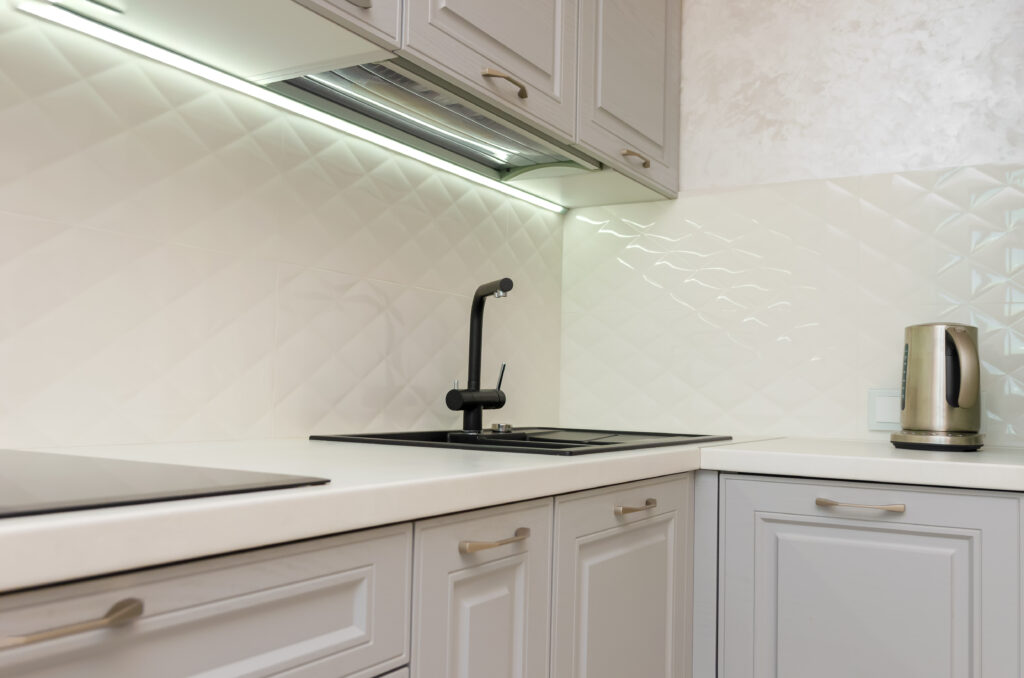
Beautiful interior of a classic kitchen in light gray and white colors with led lighting
In the charming city of Ann Arbor, where historic homes blend seamlessly with modern living spaces, maintaining the heart of your household—your kitchen—is of paramount importance. As Ann Arbor residents, you understand the unique character and style that define your homes. When it comes to kitchen renovations, one of the most common dilemmas homeowners face is whether to repair or replace their kitchen tiles. The choice you make can significantly impact your kitchen’s appearance, functionality, and overall value. This article will explore both options’ pros and cons, helping you decide whether to have an Ann Arbor handyman repair or replace your kitchen tiles.
Understanding the Dilemma
Kitchen tiles serve both aesthetic and functional purposes. They protect your walls and floors from splatters and spills while also adding character to your space. Over time, wear and tear are inevitable. Tiles can chip, crack, or become discolored, leaving you wondering about the best course of action.
The Case for Repairing Kitchen Tiles
Cost-Effective: Repairing kitchen tiles is often the more budget-friendly option. It allows you to address specific problems without tearing out the entire tile surface. Small cracks or chips can be easily patched up, saving you money in the short term.
Preservation of Aesthetics: If you love a unique or intricate tile design, repairing damaged tiles can help you preserve the original look of your kitchen. This is especially beneficial if the tiles are no longer available in the market.
Environmental Impact: Choosing to repair rather than replace reduces waste and is more environmentally friendly. You won’t be contributing to landfill overcrowding with old tiles.
The Case for Replacing Kitchen Tiles
Extensive Damage: When your tiles have extensive damage, such as multiple cracks, loose tiles, or severe discoloration, replacing them may be the more practical option. It ensures a longer-lasting and more reliable solution.
Design Overhaul: If you’re planning a significant kitchen makeover and the existing tile design no longer suits your vision, replacing the tiles gives you a fresh canvas to work with. You can choose new colors, patterns, and materials to match your updated style.
Increased Property Value: Brand-new, well-installed tiles can increase your home’s resale value, making it an attractive option if you plan to sell shortly.
Considering Tile Materials
In addition to assessing the extent of damage and your renovation goals, it’s crucial to consider the type of tile material when deciding between repair and replacement.
Ceramic and Porcelain Tiles: These tiles are known for their durability and resistance to moisture. If you have ceramic or porcelain tiles with minor cracks or chips, repairing them can extend their lifespan significantly. However, if they are severely damaged, replacing them with new ceramic or porcelain tiles can provide a fresh, long-lasting finish.
Natural Stone Tiles: Materials like marble, granite, and travertine are prized for their natural beauty. Repairing natural stone tiles may be more challenging due to their uniqueness and susceptibility to damage. In some cases, hiring a professional stone restoration expert to repair and reseal these tiles may be the best option. Replacement can also be an opportunity to explore different types of natural stone or engineered stone tiles to achieve a new aesthetic.
Glass Tiles: Glass tiles can add a stunning and modern touch to your kitchen. When damaged, replacing individual glass tiles is often the safest route, as repairs may affect their transparency and appearance. Make sure to match the replacement tiles closely to maintain a uniform look.
Cement or Terracotta Tiles: These rustic and textured tiles can be repaired if they suffer from minor issues like surface cracks. However, keep in mind that the repair process may be more visible on these tiles due to their distinctive texture and color variations.
Making the Decision
Ultimately, the decision to repair or replace kitchen tiles depends on the damage’s extent, budget, and long-term plans. If you’re dealing with minor issues and want to maintain the current look of your kitchen, repairing may be the way to go. However, if your tiles are beyond repair or you’re seeking a complete transformation, replacing them is the better choice.
In either case, it’s essential to consult with a professional Ann Arbor handyman if you’re unsure about the best course of action. They can assess the situation and provide expert guidance based on your needs and goals.
Conclusion
In conclusion, whether you choose to repair or replace your kitchen tiles, the goal is to create a functional and visually appealing space. Consider your budget, damage extent, and design aspirations when making this important decision. With the right approach, you can revitalize your kitchen and enjoy a beautiful, functional space for years to come. Check out this blog to learn how much kitchen renovation costs in Singapore and how you can plan your budget accordingly.




More Stories
The Complete Process of Chain-Link Fence Installation Explained
How to Choose the Right Custom Stone Surfaces for Kitchens and Baths
The Essential Legal Steps Every Property Buyer Should Follow